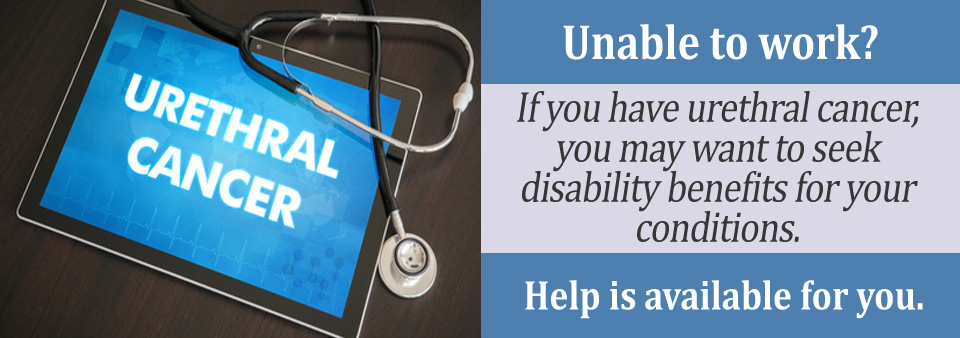Dealing with any kind of cancer can be painful, and urethral cancer is no different. The long days in the hospital, the lethargy during treatment, and the medication regimen are wearing you out. They may have even worn you out to the point where you can no longer work.
On top of the need to recover, you still need to pay the bills. How can you do that without a job?
Your best bet at maintaining your financial stability and staying afloat is applying for Social Security disability benefits. SSD benefits are meant for cases like yours where a person is unable to work due to a medical condition.
Once you qualify, you’ll get monthly financial compensation for your inability to work. This will leave you with more energy for your recovery and enough money to cover your everyday expenses.
Urethral Cancer Blue Book Listing
The Social Security Administration has a set of guidelines to determine who receives conditions; after all, the organization can’t just give out benefits to everyone. Specifically, the SSA has a set of guidelines known as the Blue Book, which lists all of the conditions that would make a person eligible for SSD benefits.
There are a total of 14 sections of the Blue Book, all of which are devoted to a particular body system and the corresponding disorders.
Section 13.00 is the one that has the qualifying types of cancer listed, and 13.22 is the section that covers urethral cancer. That section is labeled, “13.22 Urinary Bladder -Carcinoma.”
You’ll notice that it doesn’t specifically say “urethral cancer,” but bladder cancer comes closest to covering your condition.
 According to the Blue Book, you’ll be able to qualify for benefits for your cancer if it fits either one of these stipulations:
According to the Blue Book, you’ll be able to qualify for benefits for your cancer if it fits either one of these stipulations:
- Your cancer is “inoperable, unresectable, or recurrent.” In other words, your cancer can’t be treated and it keeps coming back.
- Your cancer moves to more distant lymph nodes, beyond its original site.
- Your cancer is the small-cell variety.
If you feel that your urethral cancer matches the criteria, then contact your physician so that you can start collecting the medical documents that you’ll need to file a claim. You have to prove to the Social Security Administration that your condition is severe enough to require benefits.
For example, you could have a prescription list that shows your treatment regimen and a physician’s note that details the severity of your illness.
There are a number of ways to show the SSA that your condition is severe, and your physician will be able to get you started on collecting the necessary documentation.
Compassionate Allowance
What should you do if, like many people, you simply cannot wait for SSD benefits? Perhaps your illness is too advanced or your financial straits are too dire to be able to wait months (or even over a year) for your hearing. Your situation may demand that you get help as quickly as possible.
This is where Compassionate Allowances can be helpful. The Compassionate Allowance Initiative was created to account for the fact that some people with advanced conditions need benefits right away.
Like SSD benefits, qualifying for a Compassionate Allowances means that you need to have one of the 88 conditions listed in the Compassionate Allowances Initiative.
There isn’t a specific listing for urethral cancer in the CAI, though you could qualify if your urethral cancer spreads somewhere else that is actually listed, such as the ureter. Given the complexity of qualifying for these types of conditions, speak to your doctors to find out if they have any insight on what your next steps should be.
How an Attorney Can Help
Your urethral cancer has probably altered your life in a number of ways; quite frankly, it has probably disrupted many facets of it. Don’t let your urethral cancer disrupt your financial state as well--consider applying for SSD benefits so that you can stay afloat.
Better yet, have a Social Security disability attorney help you with the process. This attorney can spearhead your claim and do all of the heavy lifting to make sure that your claim gets processed properly. You shouldn’t have to go it alone, and fortunately, you don’t have to.